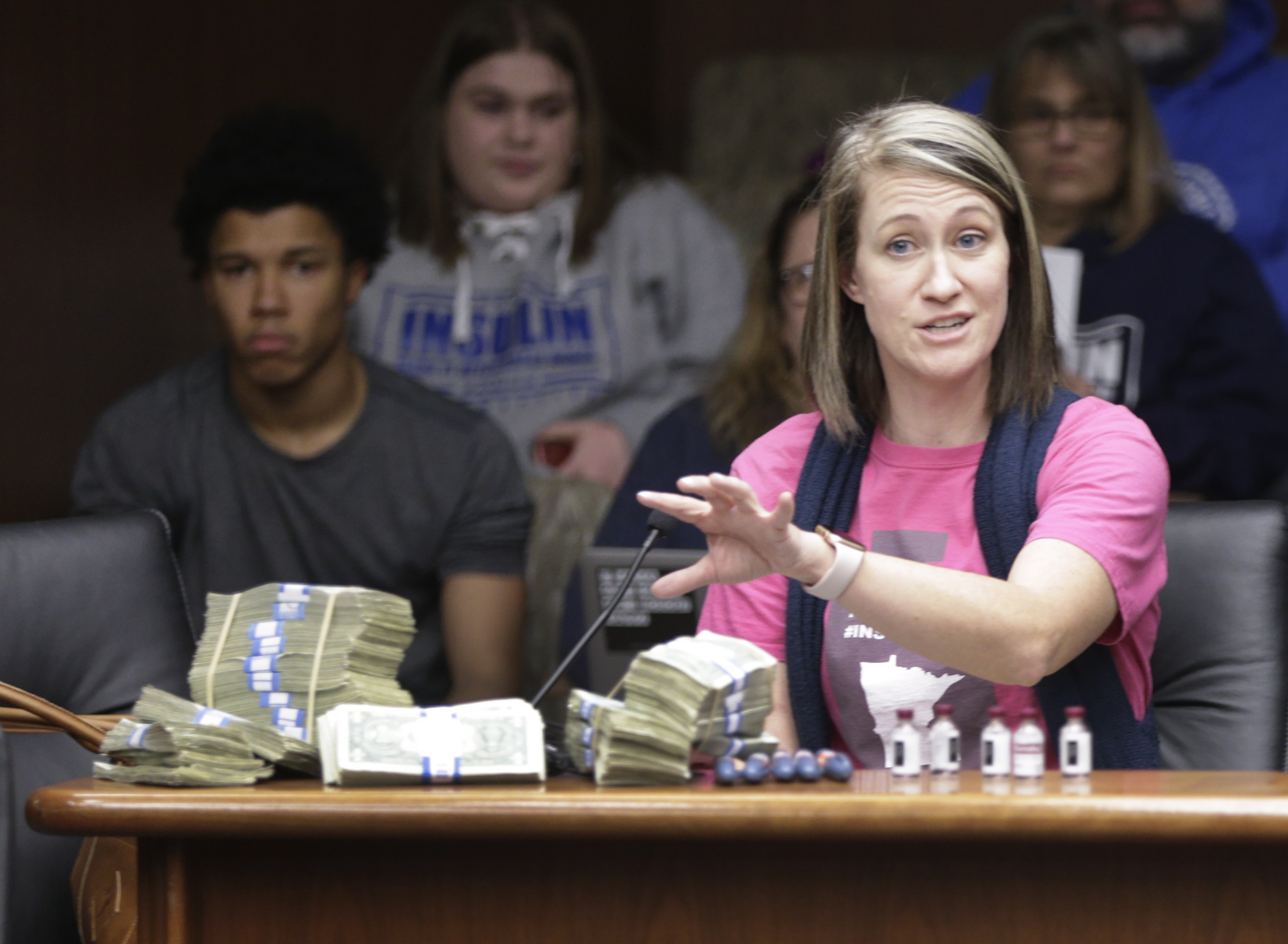Emergency insulin bill clears first committee stop on session's opening day

Shari Wiltrout wanted to inform Minnesota lawmakers just how much it costs for one month’s supply of insulin for her two 14-year-old diabetic daughters, so she decided to show rather than tell.
She pulled out of a bag $2,290 in bundles of cash Tuesday and plopped them on the table, to show the House Commerce Committee what it would cost without health insurance coverage.
“My bag costs more than my car right now,” she said.
Her daughters have benefitted from voluntary copay caps, but she keeps at least that much cash in savings just in case.
Wiltrout was testifying in support of HF3100, sponsored by Rep. Michael Howard (DFL-Richfield), to create an emergency insulin assistance program. Under the bill, eligible people could get up to a three-month emergency supply of insulin. The cost of reimbursing pharmacies for emergency insulin and administrative costs for both programs would be paid for by insulin manufacturers through a registration fee.
The bill would also set cost-sharing limits for insulin in the private insurance market and require notice be given prior to ending dependent coverage. All insulin manufacturers would have to participate in the program to do business in Minnesota.
Approved 12-7 by the committee, HF3100 next goes to the House Health and Human Services Policy Committee. It has no Senate companion.
Last year, the House and Senate passed the Alec Smith Emergency Insulin Act with bipartisan support. Alec Smith died in 2017 at age 26 when he rationed his insulin because he couldn’t afford it after aging off his parents’ health insurance. His story put skyrocketing insulin costs in the national spotlight, but differences between the two bills could not be resolved during the conference committee process.
Insulin costs have tripled in the past 10 years and one in four diabetics ration their insulin due to cost.
Alec’s mother, Nicole Smith-Holt, said insulin is the sixth-most expensive liquid in the world, with an estimated one in four diabetics rationing because they can’t afford it.
“This bill should not take until the closing days of the session to pass,” she said.
Minnesota lawmakers have been unable to come to agreement on how to make insulin more affordable, with a bipartisan group working toward a solution since the 2019 session adjourned. Since then, four large health plans have stepped up and capped copays at $25, Howard said. And since the last session, two Minnesotans have died because they could not get insulin, he said.
“This is deadly serious,” Howard said. “We have the power to take action. We simply cannot lose another Minnesotan on our watch.”
But tempers flared during the hearing, with one Republican lawmaker accusing Howard of prematurely walking away from the negotiating table.
Rep. Pat Garofalo (R-Farmington) said the “Democratic narrative” was factually inaccurate, saying three pharmaceutical manufacturers now give away more than $6 million to Minnesotans because Minnesota forced rebates to be passed on to insulin consumers.
“My advice: Declare victory and go home,” Garofalo said, because if the goal is to demonize the pharmaceutical industry, “it won’t work.”
Howard said he was offended by that characterization after Minnesotans shared “painful stories” with lawmakers.
“We are not going to declare victory until every person has access to insulin when they need it,” Howard said, sparking applause in the packed committee room.
Rep. Tim O'Driscoll (R-Sartell) was critical of Howard bringing the bill forth on the first day of the legislative session, and predicted it won’t go far. He accused Howard of walking away from negotiations with Republicans.
“When you don’t have an audience to play to, you can get things done,” he said.
Howard said the bill is a compromise culling both Republican and Democratic ideas, he hasn’t walked away from the table, and the two sides should work together in coming weeks.
“To say that we have to take it back behind closed doors is just plain wrong,” said Rep. Laurie Halverson (DFL-Eagan), the committee chair.
Related Articles
Search Session Daily
Advanced Search OptionsPriority Dailies
Ways and Means Committee OKs proposed $512 million supplemental budget on party-line vote
By Mike Cook Meeting more needs or fiscal irresponsibility is one way to sum up the differences among the two parties on a supplemental spending package a year after a $72 billion state budg...
Meeting more needs or fiscal irresponsibility is one way to sum up the differences among the two parties on a supplemental spending package a year after a $72 billion state budg...
Minnesota’s projected budget surplus balloons to $3.7 billion, but fiscal pressure still looms
By Rob Hubbard Just as Minnesota has experienced a warmer winter than usual, so has the state’s budget outlook warmed over the past few months.
On Thursday, Minnesota Management and Budget...
Just as Minnesota has experienced a warmer winter than usual, so has the state’s budget outlook warmed over the past few months.
On Thursday, Minnesota Management and Budget...